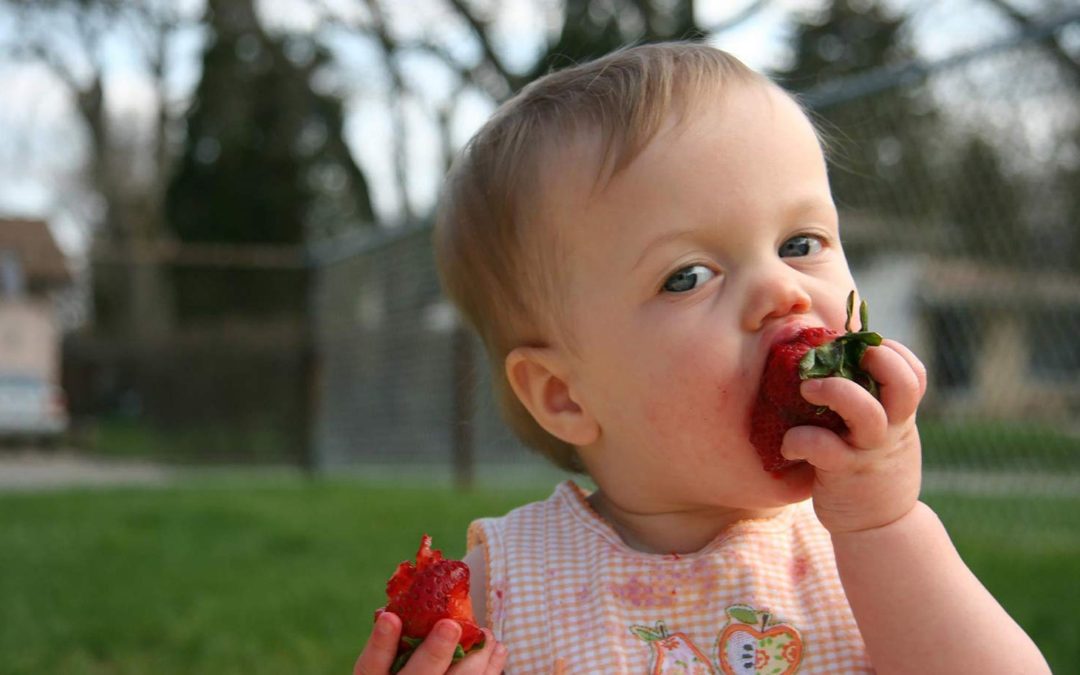The short-version how-to guide.
The American Academy of Paediatrics recommends exclusive breast-feeding for the first six months after birth. But for those who can’t sustain breast-feeding for this length of time, or for those, with who breast-feeding isn’t an option, a good formula milk will still have all the essential nutrients your baby will need to grow into a healthy and happy child.
Whether your baby is breast-feeding or on formula milk, from as early as 4 months, some babies will be ready to begin having solids added to their diet. But don’t feel pressured by time scales, remember, that all babies are different in reaching this new milestone. Some may be quite content to continue with exclusive breast-feeding and formula milk for many more months. But it is recommended from science-led studies, to start introducing solids as a compliment to breast and formula feeding by 6 months old. By this age, babies’ digestive systems are developed enough to cope, but because of the diversity of each individual, if you have any doubts, then it’s advisable to check with your health visitor.
Is my baby ready for the transition from liquid to solid? …
As we’ve already stated, every child will reach this milestone in their own time and when they’re ready. There are some obvious pointers to this, such as holding their head in a steady, upright position, sitting with support or reaching out for your food and opening their mouths. Your baby will now be able to coordinate moving solid food from the front of their mouth to the back and be able to swallow. But you must be careful to transition from liquid to puree, then to solids gradually, so that you prevent the possibility of choking. It is also important to ensure that what you’re giving your baby will not cause health risks such as allergic reactions, diarrhoea, or vomiting. Home-made food preparation is best because you are in control of the ingredients you are using, whereas commercial baby food products may contain such additives as preservatives etc.
So, let’s take a look at the recommended foods to introduce to your baby, how you can process them, and any divisive affects they may have. And the best way to do this, is to give your child only one item of food at a time. By implementing single-ingredient foods, you can introduce your child to the many sensational smells, flavours, and textures of numerous foodstuffs, but at the same time, being mindful of any possible adverse reactions certain ingredients might initiate. It is advisable to restrict the portion size you give to your baby in the beginning, so that you can monitor the positive (or sometimes undesirable effects) certain foods may have on your babies’ vulnerable digestive system.
Don’t combine – Try them one at a time …
6 months: Single-grained cereals – pureed



Single grained cereals such as rice, oats and barley are a great way to introduce your baby to solids. They can be added to breast milk or formula milk to compliment a smooth transition from liquids to solids. But remember to make sure you blend these in a sterilised bowl, and not a bottle. Experimenting with only one cereal at the time will enable you to see how your baby reacts to the various grains and avoid any that seem to cause a problem.
Cereal grains contain DHA (a type of omega-3 fat) which supports brain function and eye health. Rice cereals are easy to digest and don’t trigger an allergic reaction to gluten, whereas wheat can but both oat and rice cereals are safe for most babies. For strong bones introduce barley to your baby’s diet. Barley is rich in dietary fibre and not only helps to strengthen bones but also fights against fungal infections.
Bean puree



The health benefits of beans for your growing baby can be immense as they contain vitamins, minerals, antioxidants, fibres, and proteins. Lentils are known to be one of the easiest to digest. Then having monitored your baby’s reaction, you can gradually move on to other varieties of beans. The beans need be pureed or mashed when offering to your baby for the first time. Studies show that beans improve digestion, strengthen the immune system, and assist in the development of the brain and vital organs. Beans can also make your baby feel fuller quicker, so they are good for preventing overfeeding. But do only serve small portions as the high levels of protein and fibre content can cause gas and indigestion.
IF NEEDED : Black beans can make for nutritious meals for babies as they possess exceptional amounts of proteins, fibres and other key minerals and vitamins like calcium, iron, phosphorus, magnesium which can benefit a baby’s health.
Vegetables & Fruit – puree


The vitamins, minerals, fibres, and antioxidants found in fruits and vegetables promote good health and protect against disease. They help in your child’s development, strengthen your child’s immune system, and help them to fight illnesses.
Carrot puree is high in beta-carotene and helps to keep little eyes healthy. With a sweet taste and smooth consistency, they’re ideal in introducing your baby to vegetables. Then, one by one you can individually introduce other vegetables such as green pea puree, sweet potatoes etc. Babies’ tastes can fluctuate, but by only giving your baby one food item at a time, you can discover the most agreeable for your baby.
Meat – puree


Initiating meat early in your baby’s diet will help your baby to get the crucial iron and zinc needed. These are easily absorbed by your baby and they are vital for brain development. Meat contains highly digestible proteins and other important nutrients, including easily absorbed hemi-iron which is found in red meat, fish, and poultry, and this is known to help in the prevention of anaemia. Eating meat can also help the absorption of iron from other food sources and is recommended to be introduced as soon as your baby begins to take solids. (6 to 10 months is the ideal) Evidently, meat contains more nutrients than fruits or cereals of the same quantity, so you only need to give a small amount to make them feel satiated. But do remember, it’s important to continue experimenting with varied choices of meat, introducing only one item at a time. This will allow you to keep track of your babies’ responses, let you check for any adverse reactions, such as allergic reactions, but will also give you the confidence, that your inclusion of meat and it’s nutrients are an added benefit to their dietary needs.
When will baby be ready?
There’s no hard and fast rule for when babies can start eating finger foods. But it’s generally once they can sit up by themselves and have increased control over their hand to mouth coordination. Some babies will grab food and shove it into their mouths with a full fist, others will have mastered the art of picking food up between their forefinger and thumb. Whichever way they choose to eat, encouraging them to start eating finger foods independently will not only help them to improve their motor skills, but will mean that you can now add more exciting foods to their diet.
CONCLUSION:
Whether your baby is breast-feeding or on formula milk, from as early as 4 months, some babies will be ready to begin having solids added to their diet. Every child will reach this milestone in their own time and when they’re ready. There are some obvious pointers to this, such as holding their head in a steady, upright position, sitting with support or reaching out for your food and opening their mouths.
By implementing single-ingredient foods, you can introduce your child to the many sensational smells, flavours, and textures of numerous foodstuffs, but at the same time, being mindful of any possible adverse reactions certain ingredients might initiate:
- Single grained cereals such as rice, oats and barley are a great way to introduce your baby to solids. They can be added to breast milk or formula milk to compliment a smooth transition from liquids to solids.
- The health benefits of beans for your growing baby can be immense as they contain vitamins, minerals, antioxidants, fibres, and proteins. Lentils are known to be one of the easiest to digest.
- The vitamins, minerals, fibres, and antioxidants found in fruits and vegetables promote good health and protect against disease. They help in your child’s development, strengthen your child’s immune system, and help them to fight illnesses.
- Initiating red meat,fish and poultry early in your baby’s diet will help your baby to get the crucial iron and zinc needed. These are easily absorbed by your baby and they are vital for brain development.








